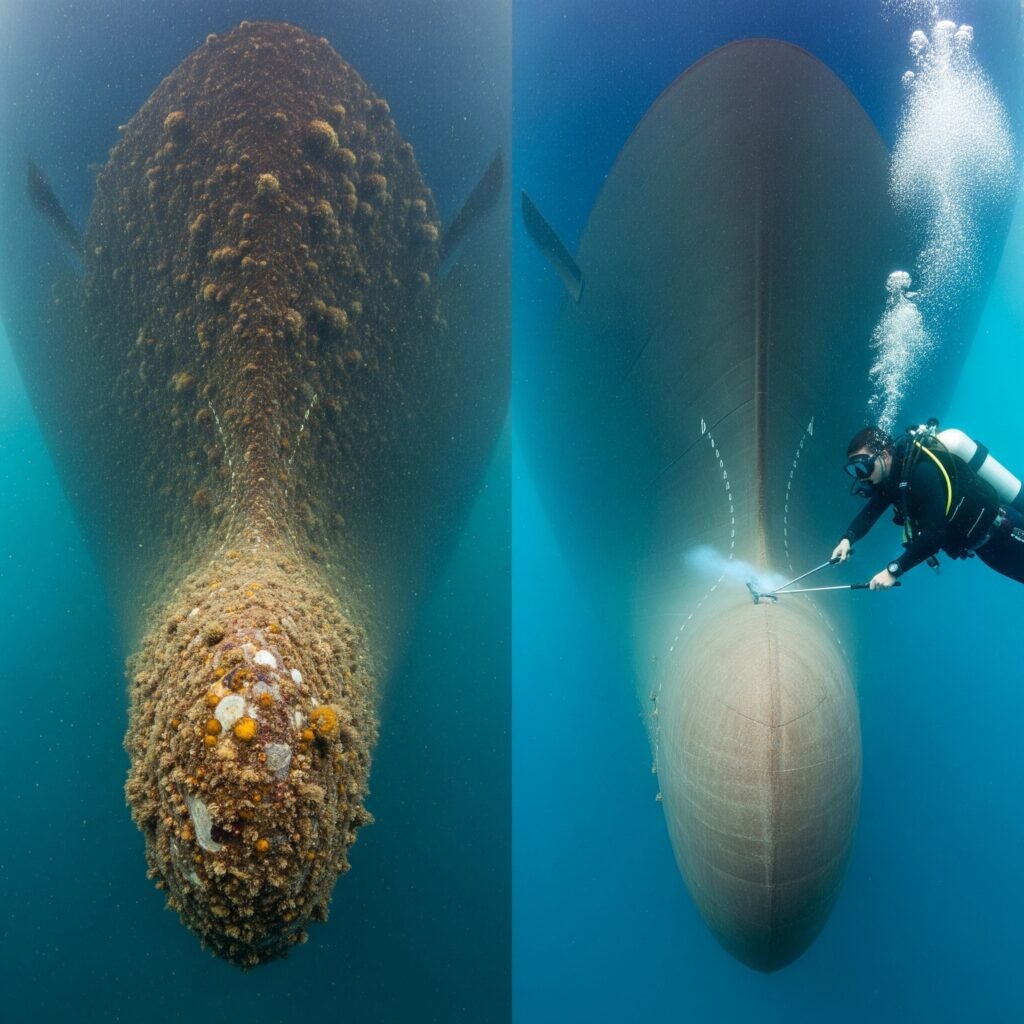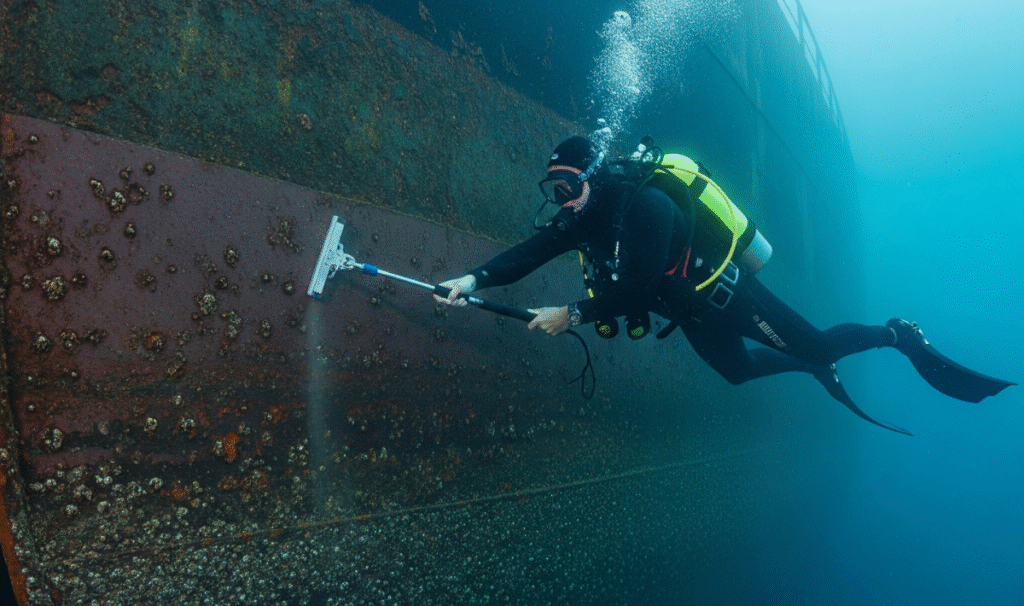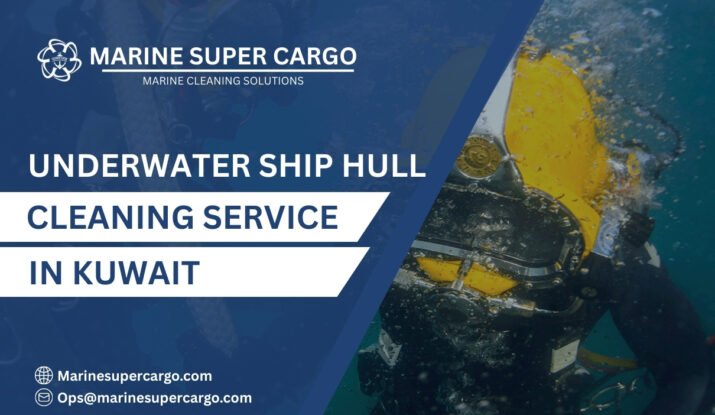Picture your vessel gliding into Kuwait’s bustling port. Sunlight glints off the hull, but beneath the waterline, a different story unfolds: barnacles, algae, and marine growth cling to every inch, turning your ship from a swift cheetah into a lumbering camel. This is why underwater ship hull cleaning in Kuwait is a must—not just a luxury, but the key to efficiency and lower costs for every shipowner.
In the competitive world of shipping, every drop of fuel and every knot of speed counts. The waters around Kuwait teem with life, which is wonderful for nature, but a headache for ships. With rising marine traffic, seeking underwater ship hull cleaning in Kuwait is now a smart, strategic move. It’s how modern shipping companies keep vessels in peak form without blowing the budget.
A Silent Battle Below the Surface: The Biofouling Challenge
What Is Biofouling and Why Is It a Problem in Kuwait?
Biofouling is the process by which marine creatures—tiny barnacles, algae, and even mollusks—stick to a ship’s hull. Kuwait’s warm waters, nutrient-rich from the shallow Persian Gulf, are a breeding ground for this hitchhiking life. Even a thin film reduces speed, causing your vessel to guzzle fuel with every mile.
Impact on Efficiency, Cost, and Marine Health
A dirty hull isn’t just unsightly. It means higher operating costs, more emissions, and even regulatory trouble if invasive pests spread to new ports. That’s why underwater ship hull cleaning in Kuwait isn’t just maintenance—it’s protection for your bottom line and the Gulf’s precious ecosystem.

Why Seek the Underwater Ship Hull Cleaning in Kuwait?
Balancing Savings and Top-Tier Service
We all want value for money, but the cheapest bid sometimes hides bigger costs down the line. The underwater ship hull cleaning in Kuwait offers the best of both worlds: controlled costs and reliable, professional service. It’s about stretching every dinar while getting results you can trust.
Risks of Cutting Corners
Poor hull cleaning can damage protective coatings, endanger diver safety, and even land you in hot water with authorities. With eco-regulations tightening worldwide, penny-pinching can mean heavy fines for polluting Kuwait’s marine environment.
Kuwait’s Unique Port Environment
The Arabian Gulf: Ancient Routes, Modern Needs
Kuwait’s shipping legacy stretches back centuries, connecting Asia with Europe and Africa. Today’s oil tankers, container ships, and workboats make use of the same busy waters. The Persian Gulf’s shallow, warm, and calm profile creates some of the world’s fastest biofouling rates—meaning ships here need underwater ship hull cleaning in Kuwait more often than you might expect.
Temperature, Salinity, and Local Biofouling Patterns
The Gulf’s unique blend of high salt, warm temperatures, and occasional sandstorms creates growth patterns that differ from anywhere else. Local providers understand these quirks, making underwater ship hull cleaning in Kuwait as timely and thorough as possible.
Types of Underwater Ship Hull Cleaning in Kuwait
Diver-Based Methods
At its heart, hull cleaning is still performed by skilled divers. With experience and sharp eyes, they carefully clear off growth with brushes, suction tools, and sometimes even underwater cameras. The best cleaning services recruit divers with IMCA certification, ensuring compliance with global best practices.
Robotic and Remote Solutions
Technology is advancing rapidly, and underwater ship hull cleaning in Kuwait increasingly uses magnetic robots or ROVs (remotely operated vehicles), especially for larger vessels or high-risk areas. These solutions can be budget-friendly, fast, and keep diver risk to a minimum.
What Matters in Hull Cleaning?
Compliance with MARPOL, IMO, and Environment-First Approaches
The difference is often compliance. Top providers adhere to the MARPOL Convention and iaphworldports.org standards, carefully capturing debris and disposing of it onshore. This “green” approach eliminates the risk of fines or vessel detention.
Local Experience and International Best Practices
The best hull cleaning partners are rooted in Kuwait’s economic reality but never skip global COCs (codes of conduct). Their teams know how to balance efficiency, environmental care, and transparent reporting—so owners can sleep easy.
Benefits of Choosing Hull Cleaning in Kuwait
Maximized Vessel Efficiency and Cost Control
Regular underwater ship hull cleaning in Kuwait slashes drag, dramatically decreasing fuel consumption and speeding up voyages. It extends the lifespan of expensive anti-fouling coatings and reduces costly drydock intervals.
Reduced Environmental Harm and Regulatory Headaches
With eco-compliant practices, the Gulf stays clean—and so does your compliance record. No fines, no bad press, and you play a vital role in defending Kuwait’s maritime legacy.

How to Choose the Right Hull Cleaning Partner
Certifications, Technology, and Transparency
When shortlisting providers, look for IMCA or IMO certification, ask about their equipment, and request before-and-after images or cleaning documentation. Transparent quotes with no hidden extras are a sign of real professionalism in underwater ship hull cleaning in Kuwait.
Future Trends: Where Is Underwater Ship Hull Cleaning in Kuwait Heading?
The rise of AI, automated hull mapping, and eco-friendly cleaning agents is rapidly changing the game. Soon, hull cleaning in Kuwait will mean even more value: faster jobs, reduced diver risk, and deeper environmental transparency. The best provider is always watching these trends, ready to invest in smarter tools and training.
Conclusion
The cost of ignoring hull fouling in Kuwait may remain unseen, but its impact is painfully real—lost speed, inflated fuel bills, environmental risks, and potential regulatory troubles. By choosing professional underwater ship hull cleaning in Kuwait, you gain peace of mind, smoother operations, and cleaner seas. Partnering with trusted experts like cleanship.co ensures your vessel benefits from compliance-driven, eco-friendly methods that safeguard both performance and reputation. In the end, it’s about protecting your investment while supporting Kuwait’s maritime future for generations to come.
FAQ:
Q1. How often should underwater ship hull cleaning in Kuwait be scheduled?
Usually twice a year, but more frequent cleaning may be required in the Gulf’s warm, nutrient-rich waters—especially for high-traffic vessels.
Q2. Is eco-friendly hull cleaning affordable in Kuwait?
Absolutely! Many providers combine green practices with wallet-friendly prices, avoiding costly fines and long-term risks.
Q3. Are robotic cleaning solutions available in Kuwait’s ports?
Yes. The best affordable companies offer remote-operated hull cleaning, excellent for larger ships and hazardous zones.
Q4. How can I guarantee my chosen provider is certified?
Always ask for proof of IMCA, IMO, or MARPOL compliance, and verify recent training or audits.
Q5. What happens if underwater debris isn’t collected properly?
Improper disposal can cost you in fines, vessel detentions, or even bans—plus, it damages the Gulf’s fragile ecosystem. Always choose certified, environmentally responsible providers.


